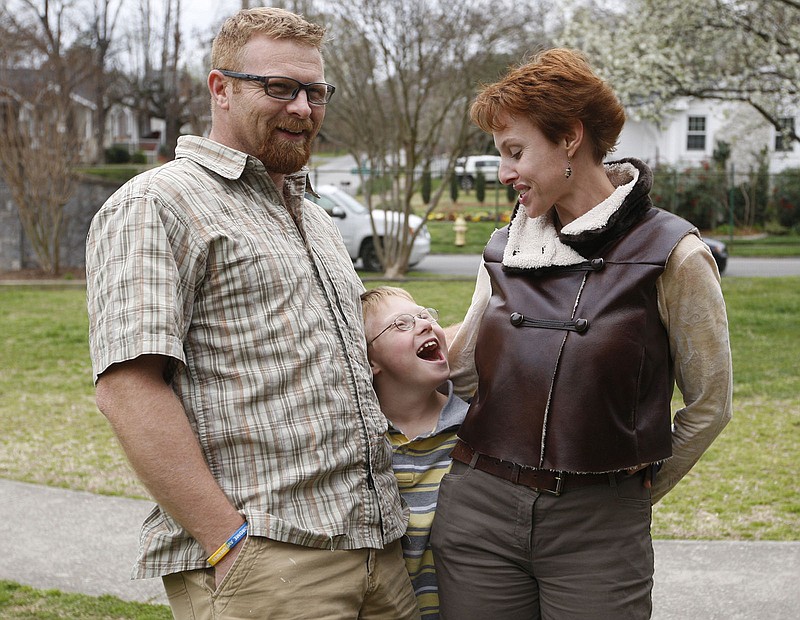The family of a former Hamilton County student is questioning the qualifications of the school system's consultant on intellectual disabilities.
During Thursday's civil trial between the Hamilton County Department of Education and the family of Luka Hyde, attorney Justin Gilbert argued in U.S. District Court that Dr. Susan Kabot is an expert on children with autism, not Down syndrome. The school system used Kabot's analysis of Luka in 2013 to justify its decision to move him away from a general education classroom.
Luka, who has Down syndrome, was in second grade at Normal Park Museum Magnet at the time. On the recommendation of teachers and administrators, Luka was supposed to move to Red Bank Elementary Comprehensive Development Classroom, a program for children with more intensive needs. He would have been separated from general education students for about half of the day.
Instead, Deborah and Greg Hyde sold their house to enroll Luka in the Montessori School, where they said their son is thriving academically and behaviorally. And after they lost a due process hearing against the school system in 2013, the Hydes filed lawsuits against the Hamilton County Department of Education and the Tennessee Department of Education, arguing officials subjected Luka to "illegal segregation" that would not prepare him for life as an adult.
The state agency settled with the Hydes for $185,000 in November after a judge ruled the Tennessee Department of Education did not have an adequate administrative complaint process for parents, a violation of federal law.
On Thursday, the fourth day of the trial between the Hydes and the Hamilton County Department of Education, Kabot defended the school system's approach to educating Luka. After observing him in class in October 2013, she determined the Montessori School was not a "match" for Luka, in part, because the school does not provide enough behavioral support.
Kabot is the executive director of the Autism Institute at Nova Southeastern University, and her organization has a contract with Hamilton County Schools.
"The teachers tried a lot of different accommodations," she testified Thursday. "They tried a lot of different teaching strategies that met what I think are his learning needs. They implemented strategies, teachings that are designed to help him make progress."
In a court filing before the trial, Gilbert argued that Kabot was not qualified to assess Luka. She specializes in autism and reached her conclusion in April 2013 after observing Luka for 15-20 minutes.
During the due process hearing in 2013, Kabot testified she believed the research about keeping children with Down syndrome next to general education students "is very mixed." But Gilbert questioned how well Kabot understood children with Down syndrome, arguing she had not worked hands-on with such a child since the mid-1990s.
On Thursday, Gilbert said Kabot had also expressed concerns about the Red Bank Elementary Comprehensive Development Classroom, where Luka would have spent some of his time delivering newspapers to other classrooms, counting money and learning calendar math.
Kabot said in a report on the program that those students need more chances to interact with general education students. For example, in a music class with both types of students, the teacher could encourage the groups to spend time together.
"What you saw was not sufficient?" Gilbert asked Thursday.
"Correct," Kabot said.
Hamilton County Schools has maintained that the Red Bank Elementary program was best for Luka's future, despite what his parents believe.
"(Luka's) parents had artificially imposed an expectation on (him) that he function at the second-grade level," an attorney for the school system wrote in March 2014. "It was only after the special education teacher rejected the parents' unreasonable expectations that (Luka's) behavior and attention to task began to improve."
On Thursday, Hamilton County Board of Education Attorney Scott Bennett said Kabot has a lot of experience working with students with disabilities. Former Florida Gov. Charlie Crist appointed her to the state's Development Disabilities Council, and Kabot said she has a strong understanding of research design and statistical analysis, he said
"That helps me understand research articles," she said, "certainly in all special education areas."
Because of scheduling conflicts, the trial will not resume in U.S. District Court until next Thursday.
Contact staff writer Tyler Jett at tjett@times freepress.com or at 423-757-6476.
